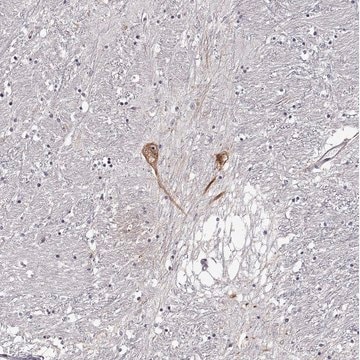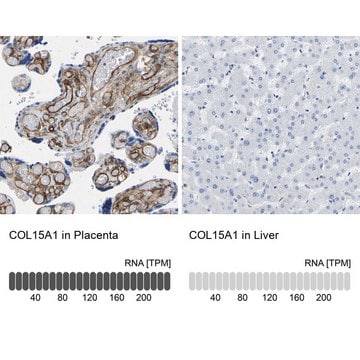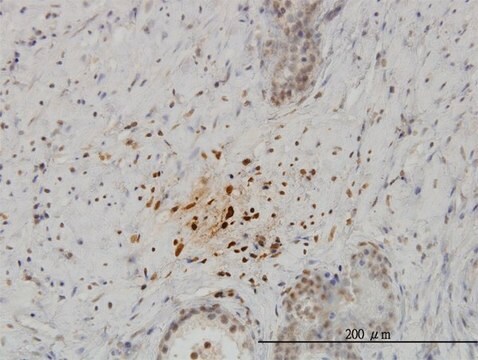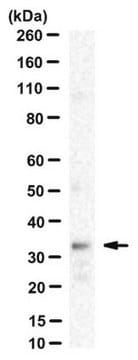MAB5456-C
Anti-Gonadotropin-Releasing Hormone Antibody, NT, clone HU11B (Ascites Free)
clone HU11B, from mouse
Synonyme(s) :
Gonadotropin-releasing hormone I, GnRH-I, Luliberin I, Luteinizing hormone-releasing hormone I, LH-RH I
About This Item
Produits recommandés
Source biologique
mouse
Niveau de qualité
Forme d'anticorps
purified immunoglobulin
Type de produit anticorps
primary antibodies
Clone
HU11B, monoclonal
Espèces réactives
human, rat, rhesus macaque, mouse
Technique(s)
affinity binding assay: suitable
electron microscopy: suitable
immunofluorescence: suitable
immunohistochemistry: suitable (paraffin)
Isotype
IgG1κ
Numéro d'accès NCBI
Numéro d'accès UniProt
Conditions d'expédition
wet ice
Modification post-traductionnelle de la cible
unmodified
Informations sur le gène
human ... GNRH1(2796)
Description générale
Spécificité
Immunogène
Application
Affinity Binding Assay: A representative lot captured C-terminally blocked GnRH-I/LHRH (LHRH-NH2), but not LHRH with a free C-terminal end (LHRH-COOH). Clone HU11B exhibited reduced affinity toward N-terminally truncated LHRH-NH2 and failed to recognize pro-LHRH, Atrial Naturetic Factor/ANF, Growth hormone-releasing hormone/GHRH, Oxytocin, Somatostatin, Thyrotropin-releasing hormone/TRH, and Vasoactive intestinal peptide/VIP (Urbanski, H.F., et al. (1991). Biol. Reprod. 44(4):681-686).
Immunofluorescence Analysis: A representative lot detected GnRH neurons in brain sections from female rhesus monkeys by fluorescent immunohistochemistry (Naugle, M.M., and Gore, A.C. (2014). Neuroendocrinology 100:334-346).
Immunofluorescence Analysis: A representative lot detected pregnancy stage-dependent GnRH-I immunoreactivity in the luminal epithelium of rat oviduct by fluorescent immunohistochemistry using paraformaldehyde-fixed cryosections (Sengupta, A., et al. (2007). J. Histochem. Cytochem. 55(5):525-534).
Immunofluorescence Analysis: A representative lot detected GnRH-I immunoreactivity in frozen mouse hypothalamic sections by fluorescent immunohistochemistry (Olcese, J., et al. (2003). Neuroreport. 14(4):613-618).
Electron Microscopy: A representative lot detected GnRH-I immunoreactivity associated with the luminal epithelium secretory vesicles of rat oviduct by EM using paraformaldehyde-fixed LR wihite sections from rats at day 16 of pregnancy (Sengupta, A., et al. (2007). J. Histochem. Cytochem. 55(5):525-534).
Immunohistochemistry Analysis: A representative lot detected GnRH-I immunoreactivity throughout the hypothalamus in paraformalin-fixed, paraffin-embedded South American plains vizcacha (Lagostomus maximus) brain sections (Dorfman, V.B., et al. (2011). J. Mol. Histol. 42(4):311-321).
Immunohistochemistry Analysis: A representative lot detected GnRH-I-positie neurons in formalin-fixed, paraffin-embedded mouse brain sections (Bergman, J.E., et al. (2010). Eur. J. Hum. Genet. 18(2):171-177).
Immunohistochemistry Analysis: A representative lot detected GnRH-I immunoreactivity in paraformaldehyde-fixed rat brain vibratome sections (Urbanski, H.F., et al. (1991). Biol. Reprod. 44(4):681-686).
Neuroscience
Developmental Neuroscience
Qualité
Immunohistochemistry Analysis: A 1:50 dilution of this antibody detected Gonadotropin-Releasing Hormone in human prostate tissue.
Description de la cible
Forme physique
Stockage et stabilité
Autres remarques
Clause de non-responsabilité
Vous ne trouvez pas le bon produit ?
Essayez notre Outil de sélection de produits.
Code de la classe de stockage
12 - Non Combustible Liquids
Classe de danger pour l'eau (WGK)
WGK 1
Point d'éclair (°F)
Not applicable
Point d'éclair (°C)
Not applicable
Certificats d'analyse (COA)
Recherchez un Certificats d'analyse (COA) en saisissant le numéro de lot du produit. Les numéros de lot figurent sur l'étiquette du produit après les mots "Lot" ou "Batch".
Déjà en possession de ce produit ?
Retrouvez la documentation relative aux produits que vous avez récemment achetés dans la Bibliothèque de documents.
Notre équipe de scientifiques dispose d'une expérience dans tous les secteurs de la recherche, notamment en sciences de la vie, science des matériaux, synthèse chimique, chromatographie, analyse et dans de nombreux autres domaines..
Contacter notre Service technique








